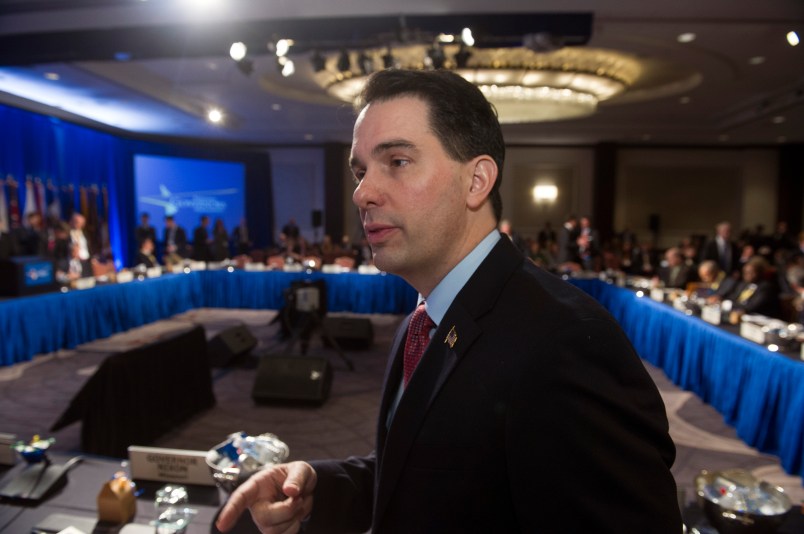As Wisconsin Gov. Scott Walker (R) prepares for a possible presidential run in 2016, he’s facing a rather unlikely source of trouble back home: his own Republican-controlled state legislature.
The tension between Walker and statehouse Republicans, who have majorities in both the upper and lower chambers, has surfaced dramatically with the announcement by GOP lawmakers that they would fast-track right-to-work legislation. It might have seemed an unremarkable proposal for Walker and Wisconsin Republicans. After all, one of Walker’s biggest accomplishments is successfully neutering the power of public sector unions by limiting collective bargaining rights.
But the move on right-to-work legislation, which bars unions from making non-members pay unions dues, highlighted a subtle but important dynamic between Walker and the state legislature. Walker had told reporters a month ago that focusing on right-to-work legislation would be a “distraction.” Shortly after, Republicans in the state legislature said they planned to call a special session to move the right-to-work proposal. Walker surrendered and said he would sign the bill when it came to his desk. (Democrats and labor leaders, unsurprisingly, oppose the bill.)
Walker had introduced a right-to-work bill that never gained much traction in 1993, when he was a state representative. He’s had more luck on championing crusades on government, including where unions come in.
“Walker has been more concerned about public sector unions than private sector unions. Public unions are more prevalent, and are seen by Walker as more problematic, because they effect the efficiency of state government,” University of Wisconsin political science professor Barry C. Burden told TPM.
Lawrence University political scientist Arnold Shober pointed out that while Republicans have comfortably controlled both houses in Wisconsin’s legislature since 2011, parts of the state legislature have moved to the right of Walker in recent years. Shober reiterated Burden’s comment about the impact of private versus public unions to Walker’s administration. Shober told TPM that for Walker, fighting those unions “really is a distraction — it seems to me he’s being honest. Walker has said that private sector unions have a place, although politics is a fickle sport.”
And while fighting private sector unions may not be as big a priority as fighting public sector unions for Walker, it is a priority for Wisconsin’s Assembly Speaker Robin Vos (R) and Senate Majority Leader Scott Fitzgerald (R).
“Right-to-work is a priority for them, and I think they want to show they can get things done that are not necessarily part of Walker’s policy agenda,” Donald Moynihan, a public policy professor at the University of Wisconsin, told TPM.
If Walker is indeed running for president, as he’s signaled, he needs to appear to be in control of his GOP legislature, which means not risking a fight over legislation that could upset conservative primary voters. Vos and Fitzgerald seem to be trying to capitalize on that reluctance, and assert their presence.
“No one is surprised that he’d sign the bill — the bill would be dead if he opposed — and he knows that it will court controversy, but he cannot afford to lose potential GOP primary voters,” Shober said. “Legislative leaders know this, and see now as an opportunity to pass right-leaning legislation while the state political climate is very favorable.”
The risky flipside is that by going along and passing a lot of red-meat conservative legislation, Walker could risk compromising his chances of actually getting the nomination.
Walker’s 2011 fight against public unions worked, in part, because it tapped into a growing frustration people had with the government, and the idea that public employees were better paid than those in the private sector. Walker tied the debate into a larger effort to fix Wisconsin’s budget woes. Right-to-work doesn’t guarantee the same, which, Moynihan said, will make it harder for Walker to defend.
“For Walker, he has already proven his bona fides on dealing with unions. Right-to-work does not win him much new support in the primaries, and might help a Democratic opponent paint him as extreme,” Moynihan said. “But it would cost him in the primaries if he does not sign a bill that comes to his desk.”







Is this article about Wisconsin or Michigan? Walker or Synder?
As Republicans are the party of “me first”, in-fighting seems to be the norm, not the exception. That being said, is being more conservative really going to hurt Walker in the primaries? I suspect by the time of the general election, assuming he gets the GOP nod, voters will have forgotten Walker’s record of anti-worker, anti-minimum wage, anti-education, anti-gay, legislation. A billion dollars from the Koch brothers will help them forget.
G.O.P. voters don’t know the difference between public sector and private sector unions, or don’t care - they hate them all, even the ones they belong to, and which have secured better wages and working conditions for them. It’s the hallmark of the non-stinking-rich Republican voter - he doesn’t recognize his self interest even when it bites him on the ass.
This can’t hurt Walker in the primaries - what, he’s counting on the AFL-CIO vote? And if he got the nomination, it wouldn’t matter in the general election, either. Walker isn’t going to get any cross-over voters from the Democratic side, and the Republicans would vote for Joseph Goebbels rather than Hillary Clinton, or any Democrat to the left of Attila the Hun, for that matter.
so, walker is going to skate on his bribery and corruption scandals?
I’m not at all seeing how this will adversely effect him in the GOP primary.